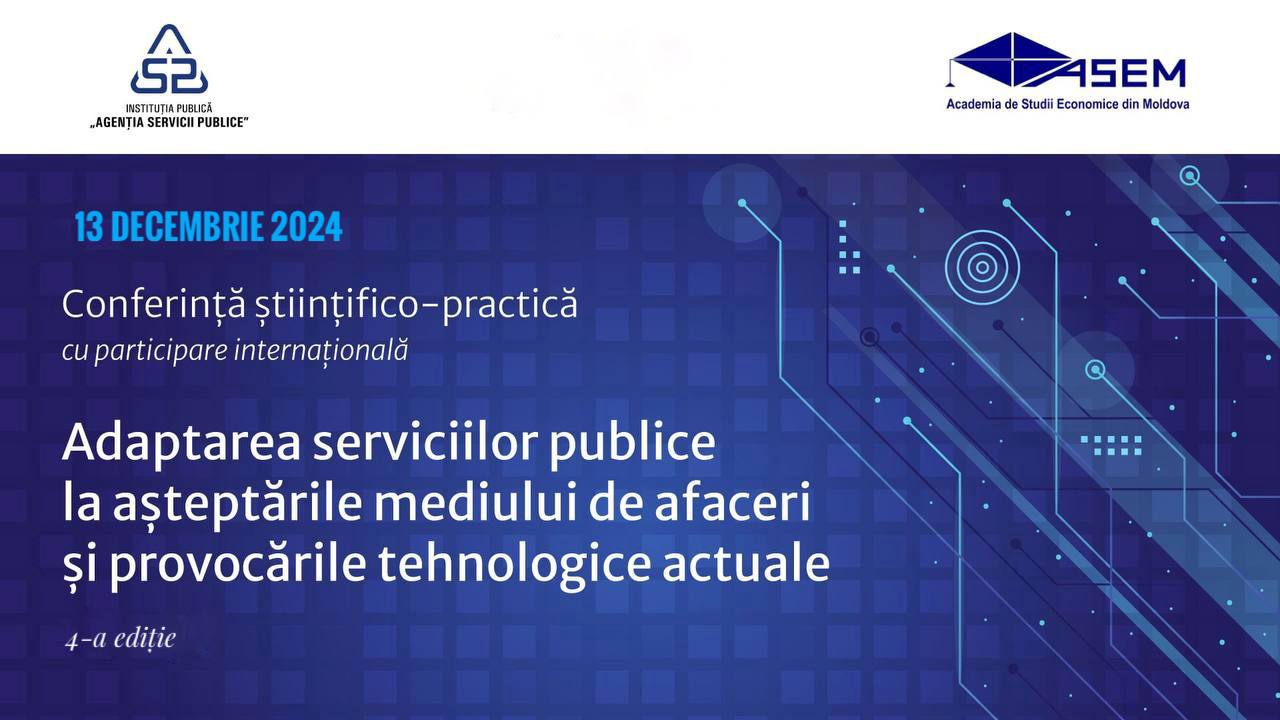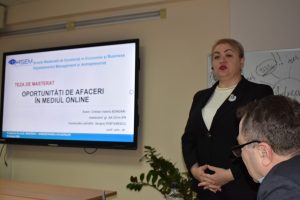Academy of Economic Studies of Moldova in partnership with ”Public Service Agency” P.I., kindly invite you to participate in the International Scientific and Practical Conference „ADAPTING PUBLIC SERVICES TO the TECHNOLOGICAL CHALLENGES AND TO THE BUSINESS ENVIRONMENT EXPECTATIONS”, the fourth edition.
The conference will be held on 13th of December 2024 at the Academy of Economic Studies of Moldova inside the GLIA Impact Hub and simultaneously online, in hybrid format.
Recommended topics for discussions:
Exploring the key factors that contribute to sustainable development and debating their significance; Examining the implementation of essential regulations in areas such as strategic sector investments, export control, licensing, and authorization; Analyzing the role of company law in promoting sustainable development, with a focus on practical implementation and corporate governance in the Republic of Moldova, particularly its alignment with European directives; Assessing the role of the state registration body in enforcing regulations aimed at preventing money laundering and financing of terrorism.; Discussing how public services can be tailored to meet the needs of the business environment; Reviewing the laws and regulations governing nonprofit organizations, including registration, tax-exempt status, and reporting requirements; Highlighting best practices in nonprofit governance, with an emphasis on accountability, board responsibilities, and stakeholder engagement and Investigating the role of nonprofits in delivering public services and addressing social issues.
Conference panels:
I. Policies, Key Regulations and Public Services in Areas of Strategic Sector Investments, Export Control, Licensing, and Authorization
This section typically addresses:
- Strategic Sector Investments: Regulations governing foreign direct investments in critical sectors like energy, defense, and technology, focusing on national security and economic stability.
- Export Control: Laws that restrict the export of certain technologies, goods, and services to protect national interests. This often involves compliance with international treaties and sanctions.
- Licensing and Authorization: Frameworks that outline the requirements for obtaining licenses in regulated industries. This includes ensuring adherence to standards for safety, environmental protection, and ethical practices.
- Current Trends: Increased scrutiny of foreign investments, particularly from non-allied nations, and the impact of geopolitical tensions on trade regulations.
II. Sustainable Economic Development and Advancements in the Area of Company Law and Corporate Governance: from Regulatory Framework, Public Services, Digital Tool Utilisation, AML and CFT Supervision to Implementation of Restrictive Measures
Key areas of focus include:
- Regulatory Framework: Developments in laws governing corporate behavior, transparency, and accountability. Emphasis on protecting shareholder rights and promoting ethical business practices.
- Digital Tools: The use of technology for regulatory compliance, such as e-governance platforms for reporting and auditing, enhancing accessibility and efficiency.
- AML and CFT Supervision: Regulations aimed at preventing money laundering and financing of terrorism, with a focus on due diligence and reporting requirements for companies.
- Restrictive Measures: Implementation of sanctions and measures against entities involved in unethical practices, with an emphasis on compliance and enforcement.
III. Nonprofit Organizations: From Regulations and Governance to Public Utility and Social Performance
This section explores:
- Regulatory Environment: Laws and regulations governing nonprofit organizations, including registration, tax-exempt status, and reporting requirements.
- Governance: Best practices in nonprofit governance, emphasizing accountability, board responsibilities, and stakeholder engagement.
- Public Utility: The role of nonprofits in delivering public services and addressing social issues, evaluating their impact on communities.
- Social Performance: Metrics and frameworks for assessing the effectiveness and efficiency of nonprofit activities, focusing on outcomes and community benefits.
Each of these areas is crucial for understanding the legal and regulatory landscape in which organizations operate, especially in the context of evolving global standards and societal expectations.
The Conference program can be accessed here: https://ase.md/wp-content/uploads/2024/10/Agenda-1.pdf
Official working languages: English, French, Romanian, Russian.
- Deadline for registration and abstract submission – 1 december 2024: https://forms.gle/S4juKKdkFv2YFmvWA
- Deadline for submission of full Paper (max. 8 pages) for double peer-review – 20 December 2024
- Conference paper template is available: https://drive.google.com/file/d/16-nj1PQuGYowhXLu6L2iG20-iKLG9XEk/view?usp=sharing
- Participation in the conference is free of charge. However, we are not able to refund any travel or accommodation costs incurred.
- If you have any questions, we kindly invite you to contact us by e-mail at: alexandra.tighineanu@ase.md






